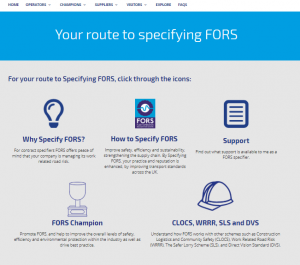 FORS has launched a new Specifiers Toolkit to assist companies as they write the best practice accreditation scheme into procurement contracts, as a route to ensuring high-quality road transport across a supply chain.
FORS has launched a new Specifiers Toolkit to assist companies as they write the best practice accreditation scheme into procurement contracts, as a route to ensuring high-quality road transport across a supply chain.
FORS, the Fleet Operator Recognition Scheme, represents 5,000 members across the UK, providing them with a progressive accreditation model through which tangible safety and efficiency gains have been made for its operators, since its launch in 2007.
FORS’s remit to drive up standards across road transport means it already works closely with a number of construction companies, local authorities and national infrastructure projects across the UK, including Thames Tideway and HS2. In such instances, FORS is listed as a prerequisite for all commercial vehicles contracted – at a level set by the organisation in question – either at its entry-level FORS Bronze subsequent FORS Silver, or the highest level, FORS Gold.
The new FORS Specifiers Toolkit, now available on the FORS website, has been designed to assist supply chain decision makers who are interested in learning how the scheme can simplify quality assurance for the commercial vehicles they may need to complete a project, or as a long-term contractor.
Paul Wilkes, FORS Business Services Manager said, “When FORS is written into a contract, it sets a standard to which all commercial vehicles entering a site, or delivering a service within a borough, must meet – from tipper trucks to minibuses. This helps organisations or large-scale build projects who sub-contract their transport operations ensure their road transport fleet is safer, smarter and greener.”
The online tool explores the simple steps an organisation can take to build FORS into a procurement contract, including providing sample contract clauses. It notes the range of support available to organisations who chose to work with FORS, including the FORS Overseer Dashboard, and details how FORS complements other schemes, including Construction Logistics and Community Safety (CLOCS).
FORS requirements are not solely limited to ensuring vehicle safety but extend to ensuring driver training and robust management and fuel efficiency policies are in place, to drive up standards. For example, FORS fleet managers and member drivers learn how to drive in urban environments, not only to protect vulnerable road users, but to reduce environmental impact, for higher efficiency and better air quality for all.
Wilkes adds, “FORS offers a straightforward, cost effective means to ensuring high-quality measurable safety and efficiency across all road transport operations. This toolkit sets out just how easy it is for organisations to specify FORS at a contractual level, to really reap these benefits.”
